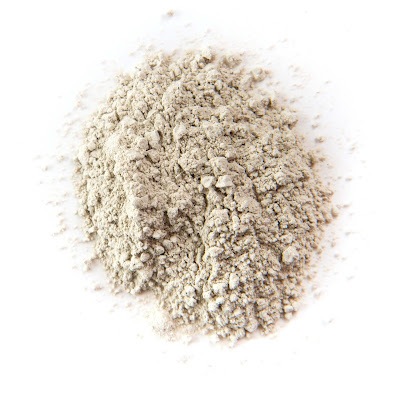Disclaimer. I am not a licensed health practitioner. This is just another post on knowledge and understanding you might wish to acquire in advance of a disaster in case no higher care is available. As long as our society is functioning, you should leave anything more substantial than applying a Band-Aid to the professionals. No medication, including those available over the counter, should be taken without consulting a physician. Information shared here is for educational and entertainment purposes only. It is not medical advice nor a substitute for licensed medical care.
Bentonite clay, a fine powder derived from volcanic ash, has been used since ancient times to treat a variety of conditions. Very similar to Montmorillonite clay, which is found near Montmorillon, France, bentonite clay is named for the place where it occurs in large amounts--Fort Benton, Montana. This and a significant source in Wyoming provide about 3/4 of the US supply. When mixed with water, this naturally occurring clay that forms a paste that is often used for treating acne and rashes. It's also the basis for many cosmetic skin masks.
However, there are several other uses of bentonite clay that merit consideration. Bentonite clay works in a manner very similar to activated charcoal--it adsorbs toxins and oils and removes them from the body. Like activated charcoal, it does not enter the bloodstream, so it is only used for conditions on the skin and in the intestines. Unlike activated charcoal, bentonite clay also contains calcium, copper, iron, magnesium, and potassium, all of which may facilitate healing. Calcium bentonite is much more effective than sodium bentonite. Following are some of the ways it is used medicinally:
Skin. For all treatments on the skin, make a soft paste and apply it to the affected area, then cover with a bandage. Replace this paste and dressing several times per day for fastest relief.
Bug bites and stings
Contact dermatitis, especially poison ivy, poison oak, and poison sumac. Wash the skin with dish soap to remove any remaining oils before applying bentonite clay.wound healing.
Diaper rash. Mix bentonite clay with water, coconut oil, or zinc oxide cream. Patients exhibit marked improvement within six hours.
Wound healing
Gastrointestinal Aflatoxin. A study on chicks showed that those given high concentrations (up to 1.5% of their body weight) of bentonite clay suffered fewer effects from aflatoxin-tainted feed.[1] Aflatoxin is produced by a mold that occurs primarily in corn and peanuts.[2] Another study on children in Ghana found that those given a supplement with Montmorillonite clay reduced their exposure to aflatoxin. Aflatoxin exposure in children stunts growth and causes wasting in young children, and may even result in death. Maternal exposure affects the developing fetus as well.[3]
Cholesterol. Limited studies have shown that bentonite clay adsorbs fat and can help reduce cholesterol. Mix one teaspoon in a glass of water and take once per day for no more than four weeks.[4]
Diarrhea, nausea, vomiting. Depending on the cause for these conditions, bentonite clay may help. It appears to be effective in mitigating morning sickness and is safe to use in pregnancy.
Rotavirus. Bentonite clay adsorbs this virus particularly well.
Cholesterol. Limited studies have shown that bentonite clay adsorbs fat and can help reduce cholesterol. Mix one teaspoon in a glass of water and take once per day for no more than four weeks.[4]
Diarrhea, nausea, vomiting. Depending on the cause for these conditions, bentonite clay may help. It appears to be effective in mitigating morning sickness and is safe to use in pregnancy.
Rotavirus. Bentonite clay adsorbs this virus particularly well.
Cautions: Bentonite clay works by adsorbing chemicals and toxins, and this may include medications as well. Be sure to take bentonite clay at least two hours before or after taking any medications so that their efficacy is not compromised. If planning to use bentonite clay internally, look for a product labeled as safe for internal consumption. Because bentonite needs to be mixed with water to become effective, it's best not to use capsules.
References:
Jennifer Berry, "11 Benefits of Bentonite Clay," Medical News Today, 22 May 2019, (accessed 6 June 2020), https://www.medicalnewstoday.com/articles/325241
[1]K. Pimpukdee, et al., "Aflatoxin-induced Toxicity and Depletion of Hepatic Vitamin A in Young Broiler Chicks: Protection of Chicks in the Presence of Low Levels of NovaSil PLUS in the Diet," Poultry Science, May 2004, 83(5), 737-44, https://pubmed.ncbi.nlm.nih.gov/15141830/, accessed 6 June 2020.
[2]https://www.ncbi.nlm.nih.gov/pmc/articles/PMC4183404/
[3]https://www.ncbi.nlm.nih.gov/pmc/articles/PMC2904249/
[4]https://www.ncbi.nlm.nih.gov/pmc/articles/PMC4759552/

No comments:
Post a Comment